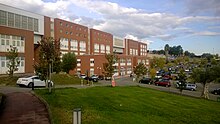University of Calabria
| Università della Calabria | |
 |
|
| Type | Public |
|---|---|
| Established | 1972 |
| Rector | Prof. Gino Mirocle Crisci |
|
Administrative staff
|
800 |
| Students | ca 35,000 |
| Location | Rende, Italy |
| Sports teams | CUS Cosenza |
| Website | Official website |
The University of Calabria (Università della Calabria, UNICAL) is a state-run university in Italy. Located in Arcavacata, a hamlet of Rende in the suburb of Cosenza, the university was founded in 1972. Among its founders there were Beniamino Andreatta, Giorgio Gagliani, Pietro Bucci and Paolo Sylos Labini. It currently has about 35,000 students, 800 teaching and research staff and about 700 administrative staff.
The Campus of the University of Calabria was originally designed by Vittorio Gregotti and Dänen Martensson. The buildings are situated along a suspension bridge, which is currently 1.3 kilometres long. As in British and North-American campuses, students live in specific residential blocks near the University. The whole structure is swathed in greenery of hills near Arcavacata, a small village at 10 km from Cosenza, and Quattromiglia.
The University is organized in the following departments:
Since its very beginning the University of Calabria has clearly set out the strategies for the development of its international dimension. In the past twenty years several bilateral agreements were established by the University of Calabria with European and other foreign universities. Such agreements aim at encouraging cooperation in the fields of research and didactic activities. Emphasis to international relationships among higher education institutions was provided by the launching of European programmes such as ERASMUS, in the 80s, which paved the way to student mobility activities. In particular, double level degrees were created as a relevant didactic offer to students participating in these exchanges. Among these we can mention the conventions established by the Faculty of Economics with the Manchester Metropolitan University (UK) and with the University of Applied Sciences Fachhochschule Bochum (Germany), and by the Faculty of Political Science with the Universidad de Jaen (Spain).
Apart from the participation in programmes co-financed by the E.U., the University of Calabria has established contacts with international organisations such as FAO, UNESCO of the United Nations, and OECD. Internationalisation will be further implemented through other trans-national research and didactic projects as a form of mission embedded by the University of Calabria. As an interesting outcome to these mobility experiences, international students who live and study on a permanent basis on campus created a small but lively community. Currently a special program for foreign postgraduate students is being implemented.
...
Wikipedia
